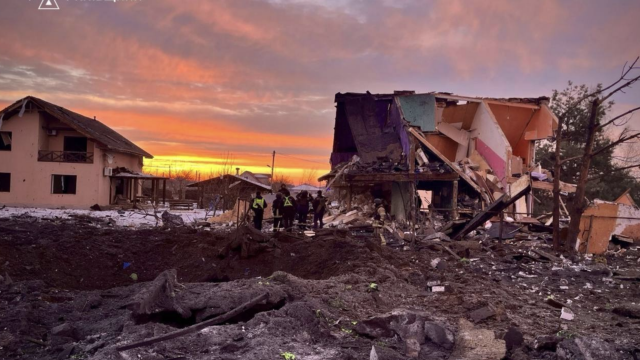| About this blog
|
| Window on Eurasia covers current events in Russia and the nations of the former Soviet Union, with a focus on issues of ethnicity and religion. The issues covered are often not those written about on the front pages of newspapers. Instead, the articles in the Windows series focus on those issues that either have not been much discussed or provide an approach to stories that have been. Frequent topics include civil rights, radicalism, Russian Islam, the Russian Orthodox Church, and events in the North Caucasus, among others.
Author Paul Goble is a longtime specialist on ethnic and religious questions in Eurasia. Most recently, he was director of research and publications at the Azerbaijan Diplomatic Academy. He has served in various capacities in the U.S. State Department, the Central Intelligence Agency and the International Broadcasting Bureau as well as at the Voice of America and Radio Free Europe/Radio Liberty and at the Carnegie Endowment for International Peace. He writes frequently on ethnic and religious issues and has edited five volumes on ethnicity and religion in the former Soviet space. |
VIENNA &mdash Because of the continuing impact of the economic crisis, Vice Prime Minister Dmitry Kozak says, Russian government plans to cut subsidies to the republics of the North Caucasus and transfer some of the money saved to hard-hit and predominantly Russian regions elsewhere.
Kozak gave no figures or dates for the cuts, and he insisted that Moscow would not leave these unstable republics to fend for themselves, but any cuts will make it more difficult for republic leaders to promote economic development, something President Dmitry Medvedev, among others, has identified as a key means of combating anti-Moscow forces.
And that in turn means that this approach to solving Moscow's budgetary problems, however popular it may be among Russians, could undermine even further the Russian government's ability to maintain control there, let alone defeat the insurgencies and integrate the North Caucasus and its peoples into Russia as a whole.
After speaking via videoconference to the leaders of the regions and republics of the Southern Federal District (SFD) on Saturday, Kozak told journalists that the situation in the regions and republics of the SFD is relatively better now than some Russian regions elsewhere.
As a result of the economic crisis and because "the south of Russia and the North Caucasus republics are the most subsidized," Kozak said, the Russian government has decided to send somewhat less money to them and somewhat more to hard-hit areas elsewhere in the Russian Federation.
Exactly how much money the former will lose and the latter will get remains uncertain, he said, because the methods for calculating subsidizes have not yet been agreed upon. But Kozak indicated that at least one of the principles involved would be "the tax potential" of the federal subjects in the future.
Another appears likely to be an assessment of how well the recipient regions had made use of subsidies up to now. "One must note," Kozak said, that "in the North Caucasus republics of the SFD has not been carried out" among other things "a reduction of expenditures on the support of organs of state power."
Indeed, he pointed out, "monitoring of budgets shows that on the entire territory of the Russian Federation, these expenditures either have stabilized or even contracted. [But] in the Southern Federal District and above all in the republics of the North Caucasus, [spending on government structures] has grown."
"This is impermissible," Kozak said, "especially in this period which is not simple from an economic point of view."
But even as he announced a policy shift that almost certainly will make the situation in the North Caucasus more unstable, he acknowledged that problems with the economy and government administration, including widespread corruption, helped to explain why some young people were joining "the bandits."
"We must do whatever we can," he said, "in order to guarantee an effective, transparent, incorruptible and impartial power in the North Caucasus. And then we will reduce the social base for the filling of the ranks of the bandits which are still in sufficient quantity here and create the necessary investment climate."
What the vice premier did not explain is how Moscow will achieve these goals if it cuts the resources available to the governments in the North Caucasus, especially since it has made little progress toward achieving them with the relatively large sums of money it has transferred into their hands up to now.
Kozak's likely response would be that these regimes could certainly do more with less. But it is likely that the officials that Moscow has chosen to rely on in the North Caucasus will not be pleased to see their own incomes cut in this way, and they may decide to take other steps, including collusion with the militants, to force Moscow to come up with more money.
A Message from The Moscow Times:
Dear readers,
We are facing unprecedented challenges. Russia's Prosecutor General's Office has designated The Moscow Times as an "undesirable" organization, criminalizing our work and putting our staff at risk of prosecution. This follows our earlier unjust labeling as a "foreign agent."
These actions are direct attempts to silence independent journalism in Russia. The authorities claim our work "discredits the decisions of the Russian leadership." We see things differently: we strive to provide accurate, unbiased reporting on Russia.
We, the journalists of The Moscow Times, refuse to be silenced. But to continue our work, we need your help.
Your support, no matter how small, makes a world of difference. If you can, please support us monthly starting from just $2. It's quick to set up, and every contribution makes a significant impact.
By supporting The Moscow Times, you're defending open, independent journalism in the face of repression. Thank you for standing with us.
Remind me later.






